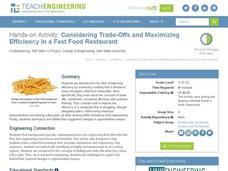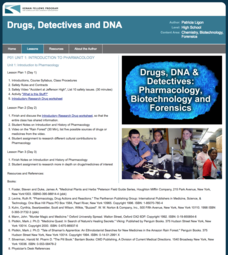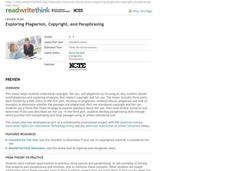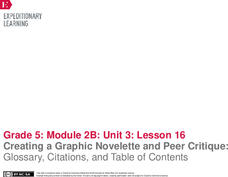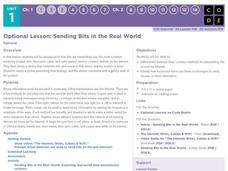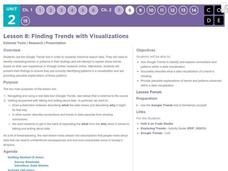Curated OER
Falling into Shapes
Children with special needs participate in several activities to reinforce shape and color recognition. They sign the word leaf, sing a song about leaves, and bounce leaves around on a parachute. They then help the instructor name...
Institute of Electrical and Electronics Engineers
Stop and Go
It's "Green light, go!" with this lesson! STEM classes are illuminated with the history of traffic signals and how the engineering design has improved over time. They also learn about patents for new inventions. Finally, they research in...
School Improvement in Maryland
Smart Growth
New roads, new businesses, new developments, new mass transit systems. All growth has both positive and negative effects on communities. Government classes investigate the principles of Maryland's 1997 Smart Growth program and the...
Teach Engineering
Considering Trade-Offs and Maximizing Efficiency in a Fast Food Restaurant
Make fast food restaurants even faster. Groups consider trade-offs when maximizing efficiency in fast food restaurants. Restructuring schedules and floor plans, as well reassigning job duties, all fall under this directive.
Stanford University
Battle of the Somme
The Battle of the Somme was a conflict that raged on for months. Academics view a presentation and read text excerpts from newspaper articles to understand the events that turned the battle into a long conflict. The presentation also...
University of Washington
Connecting Youth to Quality Health Information
Many teenagers don't have adequate access to health and nutrition information beyond a quick Internet search. Guide them into health advocacy and proficiency with a lesson focused on MedlinePlus as a reliable source for health...
Teach Engineering
Bridge Types: Tensile and Compressive Forces
Bridges rely on tension and compression to keep them standing. Pairs test this principle by constructing simple bridges and applying a force to the center. Teams use the provided worksheet to record their observations of the reaction of...
Peabody Essex Museum
Chinese New Year Celebrations
Gong He Xin Xi! Happy New Year! Planning a Lunar New Year/Spring Festival Celebration? Check out the activities and resources in a packet that encourages pupils to research the cultural values and traditional practices associated with...
NOAA
Journey to the Unknown
What's it like to be a deep-sea explorer? Tap into the imaginations of your fifth and sixth graders with a vivid activity, the second part of a six-part adventure. Learners close their eyes and submerge themselves in an expedition aboard...
Kenan Fellows
Unit 1: Introduction to Pharmacology
Learn about the study of medications, including those found in nature and those made synthetically. The first of four lessons in a series on pharmacology includes lectures, hands-on experiments, research, and more.
Curated OER
Schools Going Solar
If your school has a photovoltaic system, you can use this lesson plan to guide learners through an investigation of the factors affecting performance. Familiarize yourself with the data acquisition system, and then provide data for your...
Classics for Kids
"Mars" from The Planets
Gustav Holst's The Planets provide young musicians an opportunity to examine how composers can create a suite: a collection of smaller pieces grouped to explore a single topic. After listening to "Jupiter," they examine "Mars" in detail,...
Social Media Toolbox
Cyberbullying
What can we do to make our school community more aware of cyberbullying? From The Social Media Toolbox, lesson 10 of 16 takes on the tough topic of bullying. Learners research cyberbullying through online research, then create an...
Carnegie Mellon University
Debate
Set your environmental studies class up to debate a current topic regarding your choice of six suggested statements about energy use in the United States. Teams read material that you have gathered and then form their arguments. The...
Curated OER
Nuclear Chemistry Project
Radiation has numerous real-world applications, some of which are relatively safe while others can be extremely hazardous. In this nuclear chemistry project, young scientists choose a practical use of nuclear reactions to research in...
ReadWriteThink
Exploring Plagiarism, Copyright, and Paraphrasing
Plagiarism, copyright, and fair use are the focus of a three-part instructional activity designed to inform scholars of how to properly cite others' work. First, pupils use a KWL chart to begin thinking and discussing plagiarism. They...
University of California
Hot! Hot! Hot!
Calories are not tiny creatures that sew your clothes tighter every night, but what are they? A science activity, presented at multiple levels, has learners experiment with heat, heat transfer, and graph the function over time. It also...
Nuffield Foundation
Investigating Enzymes Used in Laundry Detergent
It's a win-win situation: learn about enzymes and get clean clothes, too. Young scientists add enzymes to a dilution of laundry detergent. They apply them to stained fabrics to determine the effectiveness of the enzyme-filled detergents.
California Department of Education
In the Interview Hot Seat
Interviews can be so stressful. How does someone stay calm and confident in the interview hot seat? Senior job seekers get acquainted with common interview questions during the fifth of six career and college readiness lessons....
EngageNY
Creating a Graphic Novelette and Peer Critique: Glossary, Citations, and Table of Contents
A, B, C ... let's alphabetize to get organized! Using the informative resource, scholars create an alphabetized glossary of key words for their graphic novelettes. Additionally, they create a table of contents and citations page.
Statistics Education Web
It Creeps. It Crawls. Watch Out For The Blob!
How do you find the area of an irregular shape? Class members calculate the area of an irregular shape by finding the area of a random sampling of the shape. Individuals then utilize a confidence interval to improve accuracy and use a...
Code.org
Sending Bits in the Real World
A bit optional. How do computers transmit in the real world? Pupils research a device that is used in transmitting bits, then individuals create a poster that presents the information they have learned about their device.
Code.org
Text Compression
The second instructional activity in a unit of 15 introduces pupils to text compression. The class begins with discussing how they already use text compression when sending text messages. Pairs learn more about the subject as they work...
Code.org
Finding Trends with Visualizations
Pupils often hear about trends, but they don't always see them. The eighth lesson in a unit of 15 requires individuals to use the Google Trends tool. Class members identify patterns in the visualization before presenting the patterns...





